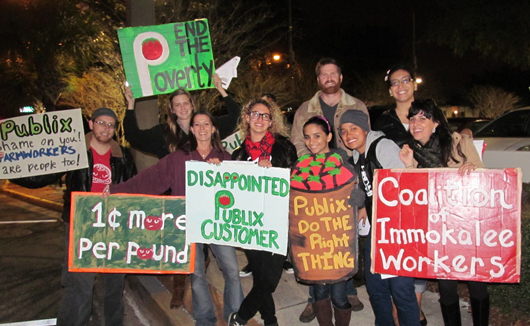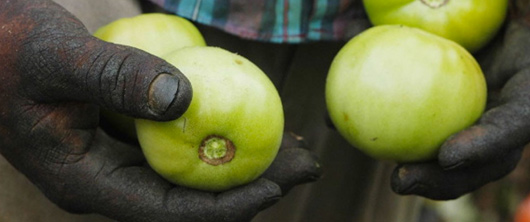More pics, more video, more media from the Thanksgiving Week of Action!
Brown University students gather for a tour of Stop & Shop stores in the Providence, RI, area, where they met with managers and distributed informational flyers on the Fair Food Program to customers with the headline “We’re thankful for the workers who harvest our food. Is Stop & Shop?”
The Thanksgiving Week of Supermarket Action was so big that, just when we had finally crawled out from under the avalanche of photos and media reports and posted Monday’s massive week of action round-up, what did we see hurtling our way? More photo reports, videos, and media stories from more actions across the country, lots more! And so, we present to you the Thanksgiving Week of Action round-up, Part Two…
We begin the second installment of our round-up with this fine bit of video reporting (below) from the formidable crew out in Colorado with Denver Fair Food. As you’ll see, what the video may lack in production value (we have gotten mighty spoiled around here lately, what with the epic “Tale of Two Thanksgivings” still drawing crowds), it more than makes up in spirit and creativity:
You can find more video briefs from Albuquerque, NM, and Gainesvile, FL, here and here, respectively.
And speaking of spirit and creativity, the folks at Tampa Bay Fair Food were not about to let a bunch of Coloradans outshine them. So they donned their turkey  beaks and tails and headed to a local Publix to express their support for the farmworkers who put the food on all our Thanksgiving tables (right).
beaks and tails and headed to a local Publix to express their support for the farmworkers who put the food on all our Thanksgiving tables (right).
But perhaps most surprising was the amount of media attention paid to the Thanksgiving actions during a week when media coverage is traditionally quite slow. In the last update we posted many of the news stories that came out around the actions across the country, and today we’d like to
share some of the commentary that buzzed around the blogosphere in response to the Thanksgiving actions and video.
Rabbi Rachel Kahn-Troster, Director of North American Programs for longtime CIW allies Rabbis for Human Rights North America, wrote an extremely thoughtful article for the Huffington Post which merits an extended excerpt:
|
“…Farmworkers want real solutions, not charity. As a member of the Coalition of Immokalee Workers, Gerardo Reyes has repeatedly said, ‘Why do I spend every day harvesting food for the rest of America and then have to stand in line at a food pantry on Thanksgiving for a plate of food?’ There is a solution: an amazing, worker-led organization in Florida called the Coalition of Immokalee Workers is bringing transformation and justice to the tomato fields. Their Fair Food Program is grounded in human rights and dignity for farmworkers. Under the Program, retailers (such as major fast food companies and grocery stores) commit to paying an extra “penny a pound” premium for tomatoes directly to the farmworkers (raising their wages without raising costs for growers) and to only buying from growers that have instituted a strict human rights code of conduct in the fields. The first farmers agreed to implement these agreements in 2010, and last year was the first year that the Program was in place in more than 90 percent of Florida’s tomato farms. In Immokalee, I hear stories of how the Program is changing lives. One man tells of how he used to get up hours before his children to go to the fields, just to sit unpaid waiting for the work to start. Now, because there are time clocks in the fields that require payment for all hours on the job and which discourage unpaid time in the fields, he leaves later and can see his children in the morning for the first time in their lives. Another man was the subject of both wage theft and a subsequent denial by the grower that he had ever picked tomatoes in those fields. After an investigation by the Fair Food Program, the grower had to acknowledge that he had worked there, and the man walked through the front door of the company to receive his paycheck. Complaints of violence or harassment are taken now serious and investigated, and there are market consequences for failing to appropriately respond to sexual harassment or forced labor. Workers have received over seven million dollars of wage increase through the penny-per-pound pay increase, and they finally have the right to water and shade in the fields. This year, I am thankful the Fair Food Program is making a difference. The Fair Food Program is unique among the various supply chain audits that human rights groups use because it prioritizes the wisdom and experience of the workers themselves in ending abuses in the fields. The workers educate each other about their rights, both under the Program and under American law. They now know there is a confidential way to report abuses that will be taken seriously. This year, I give thanks for the 11 corporations who have already signed Fair Food Agreements, including two — Trader Joe’s and Chipotle — who have signed in 2012. But many grocery stores have not yet committed to this new day in the tomato fields. For example, in the CIW’s home state of Florida, Publix Supermarket has refused to sign a Fair Food Agreement. Publix founder, George Jenkins, said: “Don’t let making a profit get in the way of doing the right thing.” It is unfortunate that today, when there is such a clear way for Publix to “do the right thing,” that Publix has not demonstrated that it values the hard work of farmworkers who make possible the food we share this holiday. They need to hear from us that it is time for that to change. This Thanksgiving, as we thank God for the many people and their hands that produce our food, we can be thankful for the Coalition of Immokalee Workers and the Fair Food Program. There is a story of real suffering behind our food, but today that story is changing, thanks to the historic partnership among workers and growers and retail purchasers established in the CIW’s Fair Food Program.” read more |
But Rabbi Rachel was hardly alone. The food blog Inherit the Spoon added:
| “This Thanksgiving, the CIW created a video and e-action directed specifically to Publix, one of the major Florida supermarkets that is still refusing to participate in the Fair Food Program. By contrasting the Thanksgiving days of a farmworker and a consumer, they hope the video will show “that we are inextricably linked by our food system and all have a stake in transforming it for the better.” The CIW is circulating a petition to Publix grocery stores, hoping that in addition to the work they do providing meals to impoverished farmworkers around Thanksgiving, they will also take real and permanent action to address the root causes of farmworker poverty.” read more |
While over at Civil Eats, another widely-read food blog, they wrote:
| “’I’m thankful for all of you,’ says the patriarch praising a table of plenty where friends, family, and food take center stage. This scene is the setting of Publix’s several Thanksgiving commercials–like this one–that positions the Florida-based grocery store chain as the oracle of gratitude. He is not only saying grace for the turkey and stuffing, but for all of you as well, because without you, they wouldn’t be able to come together and host such a fine dinner. In fact, they wouldn’t be able to provide for anyone’s Thanksgiving dinner if it weren’t for some key players–the farmers and farmworkers who are vital to a grocery store’s success.These commercials create theater, where food means family and family means Publix. This is a very fine motif, but an incomplete and skewed one…
… To counter this, the campaign is diligently working to break through these barriers of resistance, focusing on Publix’s opposition. As one of the leading buyers of Florida tomatoes, Publix has refused to work with the CIW on any agreement that pays farmworkers a penny more per pound or guarantees fair labor practices. However, Publix’s plans to expand into other states and this could change as communities set terms and conditions that demand that the grocer come to an agreement with the CIW before moving in.” read more |
And, ultimately, it comes down to that: Supermarkets will change when communities force them to, and not before. The supermarket industry has had twelve years to heed the call for ethical supply chain standards, and for twelve years supermarket leaders — not only Publix, but Kroger, Stop & Shop, Giant, and more
— have turned a blind eye to abuses in the fields where they buy their produce. They have made one thing perfectly clear: They will not come to the table willingly, they will only come when enough consumers make their demands for Fair Food heard forcefully enough and widely enough that they have no other choice.
And so it is fitting that we close this update with one more picture from one more community — Orlando, Florida — raising its voice during the Thanksgiving Week of Supermarket Action so that it, too, may be heard among the growing chorus of communities calling for Fair Food:


